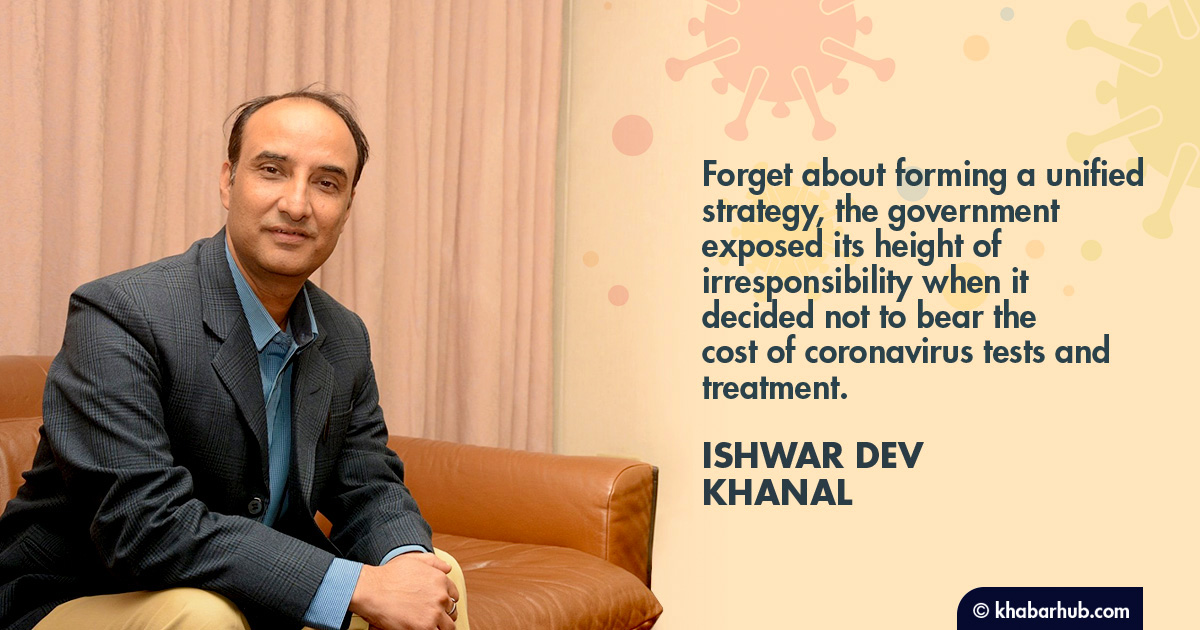The Government of Nepal has exhibited a botched response to the coronavirus pandemic. The government’s initial reaction to the COVID-19 pandemic was sluggish, and its combat with it has been quite inefficient.
The government acted slowly, and now it has expressed its unwillingness to shoulder the responsibility raising serious apprehensions about its capacity to contain the virus.
If reports are to be believed, the issue of coronavirus pandemic even does not get a place in the cabinet meetings.
As of October 21, the country recorded as many as 1,44,872 cases of the virus and 791 deaths, and the number of infections is on the rise throughout the country, mainly in Kathmandu Valley.
The Nepal Communist Party (NCP) government even failed to develop a national strategy for testing and tracing — a component considered in the success of containing the virus in several countries, including Sri Lanka.
The government seems to be refusing to act. And in the context of the pandemic, Prime Minister KP Oli seems to be giving a damn as his priority has been rewarding his brethren rather than addressing people’s anguishes.
To reiterate, Nepal’s response to the coronavirus pandemic has been abysmal even though the government implemented restrictive measures such as imposing a lockdown, prohibitory orders, closing schools and educational institutions, maintaining social-distancing rules, among others during the initial stage in March.
Forget about forming a unified strategy, the government exposed its height of irresponsibility when it decided not to bear the cost of coronavirus tests and treatment.
The government even failed to make coherent decisions in response to the coronavirus pandemic as it was focused more on other trivial issues.
The pandemic has also exposed an important deficiency in the government’s structure — the lack of a central command.
Although at the beginning of the pandemic, the government formed a high-level Covid Crisis Management Center headed by Deputy Prime Minister Ishwor Pokhrel, it has now become indolent – meaning doubtful about its existence!
The absence of a clear chain of the CCMC has resurfaced in the country’s caseload and the death figures.
Meanwhile, public mistrust of the government has made the coronavirus outbreak even more deadly.
Moreover, even though the government put rules in place to restrict the spread of the virus, people across the country, including in Kathmandu, were reluctant to follow them. People simply ignored the government’s instructions and traveled widely.
In fact, the coronavirus outbreak in the country has once again exposed the Prime Minister KP Oli-led government’s lack of preparedness to handle emergencies and disasters.
After months of denying the severity of the coronavirus pandemic, PM Oli’s response to the outbreak has been confusing and ridiculous as he repeatedly told the people and even the parliament that the virus would “disappear while sneezing” or consuming turmeric powder with hot water.
PM Oli seemed to deliberately play the threat down as he relied too often on his coterie of advisors and interfered with the assessments of the doctors and health experts even though coronavirus patients have overwhelmed the country’s hospitals.
Rather than recognizing the severity of the pandemic, PM Oli has tried to thwart efforts to create a unified strategy on it as the lack of coordination between the federal and the provincial governments has left the people with mixed signals about the severity of the pandemic.
As the world comes together to combat the coronavirus pandemic bringing all governments and individuals together, the Oli-led government cannot walk away from its responsibility.
Forget about forming a unified strategy, the government exposed its height of irresponsibility when it decided not to bear the cost of coronavirus tests and treatment.
A cabinet decision on October 5 said the government would only treat patients who are poor, disabled, single women, elderly people above 70, frontline health workers, cleaning staff and security personnel, something which was widely criticized as a “disastrous” move.
Even the main opposition party Nepali Congress and other parties lambasted the government’s decision that came at a time when the country needed high levels of testing amid the increasing number of coronavirus infected patients.
Even though suggesting the government to take reasonable steps to deal with the Covid-19 pandemic is sure to go astray, serious concerns are being raised whether the government’s actions are genuinely focused on dealing with the pandemic.
As the world comes together to combat the coronavirus pandemic bringing all governments and individuals together, the Oli-led government cannot walk away from its responsibility.
However, the best way on the part of the general people to win the battle against the COVID-19 is to end laxity in their behavior. It is high time that people broke the chain of coronavirus transmission.









Comment